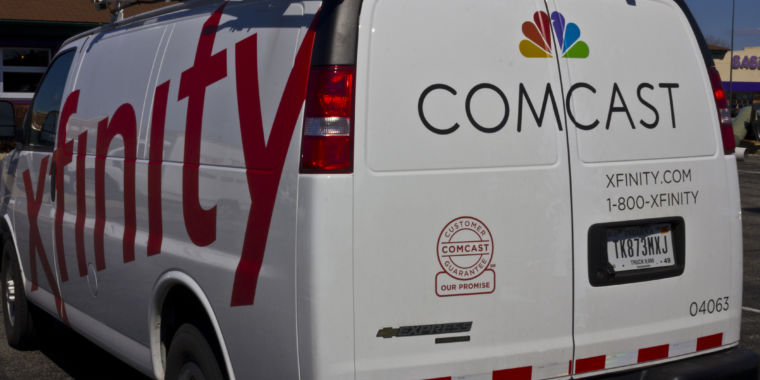
Getty Images | jetcityimage
Comcast recently installed Wi-Fi equipment in public rights of way without permits in the city of Corvallis, Oregon. But instead of settling the matter locally, a cable lobby group that represents Comcast told the Federal Communications Commission that it should override municipal permitting processes such as the one in Corvallis. In doing so, the cable lobby group made “misleading and inaccurate” allegations about what actually happened in the Comcast/Corvallis dispute, according to city officials.
NCTA—The Internet & Television Association, the cable industry’s chief lobby group, told the FCC last month that it “should declare that local governments may not abuse routine permitting processes for construction activity as a backdoor way of extracting unwarranted authorizations and fees from cable operators and otherwise delaying the deployment of new facilities.”
NCTA’s filing provided several examples allegedly demonstrating that cities and towns are unreasonably holding up network construction. These examples prove that “cable operators are facing unwarranted impediments in their efforts to deploy state-of-the-art broadband networks as a result of abusive permitting requirements,” the NCTA claimed.
Of Corvallis and Comcast, NCTA wrote:
A community in Oregon has refused to issue permits allowing installation of Wi-Fi equipment on cable facilities, on the grounds that the equipment does not support cable service, even though the equipment is used in part to allow cable subscribers to watch subscription video programming on their mobile devices.
City: Comcast needs permit for Wi-Fi service
But that isn’t what happened at all, Corvallis City Manager Mark Shepard told the FCC in a letter yesterday:
NCTA’s letter references a ‘community in Oregon’ that ‘has refused to issue permits allowing installation of Wi-Fi equipment….’ NCTA does not name the community that it is accusing in this statement. Corvallis has been addressing Comcast’s unauthorized placement of Wi-Fi equipment in the rights of way (‘ROW’), without either applying for the necessary permits or consulting with the City prior to installing its Wi-Fi equipment, so to the extent this allegation is referring to Corvallis it is misleading and inaccurate. Corvallis strongly objects to NCTA’s characterization of its actions as ‘abuses’ when it is Comcast that has failed to follow generally applicable City codes and the terms and conditions of its negotiated franchise agreement.
Here’s what really happened, Shepard told the FCC:
There are two issues regarding Comcast’s installation of Wi-Fi equipment in the City’s ROW. Initially, Comcast installed Wi-Fi units in the City’s ROW without application for construction permits. These installations would require a construction permit per Comcast’s franchise agreement. When the City inquired about the units, the installation and their function, Comcast stated that in addition to allowing wireless access to video services, the units also provided non-cable service to non-cable customers, even though Comcast’s franchise does not authorize use of the ROW to provide non-cable services to the general public. The City encouraged Comcast to apply for a telecom franchise to remedy the situation, just as the City would require a franchised telecommunications provider to obtain a cable franchise prior to using the ROW to provide cable services.
The construction is apparently for Comcast’s network of public Wi-Fi hotspots, which can be used by cable subscribers or by non-cable subscribers for a fee. Corvallis has more than 54,000 residents.
The NCTA’s “blatant misconstrual of facts casts a cloud” over the lobby group’s assertions, Shepard wrote. Given that, Shepard told the FCC that it should “not rely on NCTA’s vague accusations against Corvallis or any other unnamed jurisdiction” in its decision-making.
“Further, the City objects to NCTA’s proposals as stated in the letter, which would require Corvallis to ignore the terms of its negotiated franchise with Comcast and create disparities in the City’s application of its otherwise generally applicable rights of way use requirements,” Shepard wrote.
The FCC next month will vote on a related proposal, which it says will “preempt, on an expedited case-by-case basis, state and local laws that inhibit the rebuilding or restoration of broadband infrastructure after a disaster.” The proposal would also preempt “state and local moratoria on telecommunications services and facilities deployment.” But it’s not clear whether the FCC will act on the NCTA proposal that led to the conflict with Corvallis.
We contacted Comcast and the NCTA today and will update this story if we get any response.
Be the first to comment